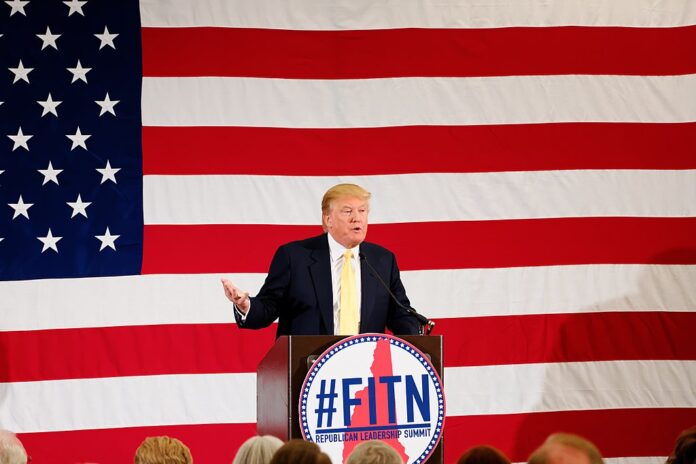Former President Donald Trump proposes replacing the income tax with tariffs, faces backlash for calling Milwaukee ‘horrible’ ahead of the republican convention
Donald Trump stirred controversy during his visit to Capitol Hill, where he engaged with Republican lawmakers on various policy issues ahead of the upcoming election. Trump, seeking to bolster unity within the GOP, discussed significant changes including tariffs as a replacement for income tax and advocated for state autonomy on abortion policies.
In meetings with House and Senate Republicans, Trump emphasized the potential benefits of shifting from income tax to tariffs, a move he believes could simplify tax structures and incentivize domestic production. Representatives Thomas Massie and Marjorie Taylor Greene highlighted Trump’s proposal, which aims to appeal to working-class voters by reducing taxes on tips and expanding tariffs, particularly targeting Chinese imports.
Embed from Getty ImagesDespite efforts to unify the party, Trump’s remark disparaging Milwaukee, where the Republican National Convention is slated to be held, sparked immediate backlash. Describing the city as “horrible,” Trump’s comments drew criticism from both Democrats and some Republicans, citing Milwaukee’s ongoing issues with crime and alleged voter fraud, which were disputed by a nonpartisan 2020 election audit.
The visit marked Trump’s return to Capitol Hill since the January 6 insurrection, an event that Democrats condemned, asserting that Trump’s presence was unwelcome given his role in inciting the violence. Conversely, Republican lawmakers focused on discussions about expanding their House majority and overturning the Democrats’ narrow Senate lead.
Trump’s stance on abortion also surfaced during the meetings, where he advised against a national ban and instead advocated for states to determine their own abortion policies post-Supreme Court decision. This move aligns with Trump’s strategy to decentralize federal authority and empower states to legislate according to local preferences.
In addressing economic policies, Trump criticized recent U.S. aid to Ukraine, questioning its strategic benefits, and reiterated his support for tariff-driven economic strategies similar to those implemented during his previous presidential term. His proposals, while popular among certain segments of the electorate, continue to divide opinions within the Republican Party and beyond.
Analysis:
Political: Trump’s visit underscores ongoing efforts to consolidate Republican support ahead of the election, focusing on economic policies and state-level autonomy on contentious issues like abortion.
Social: His comments on Milwaukee highlight broader debates about urban challenges and the portrayal of cities in political discourse, impacting voter perceptions in crucial swing states.
Economic: Proposals to replace income tax with tariffs reflect Trump’s protectionist economic philosophy, aimed at revitalizing domestic industries and reshaping international trade dynamics.
Legal: Advocating for state autonomy on abortion echoes broader shifts in federal-state relations post-Supreme Court decisions, potentially reshaping the landscape of reproductive rights legislation.
Ethical: Criticism over Trump’s comments on Milwaukee raises ethical concerns about the portrayal of cities and their impact on local communities and political discourse.
